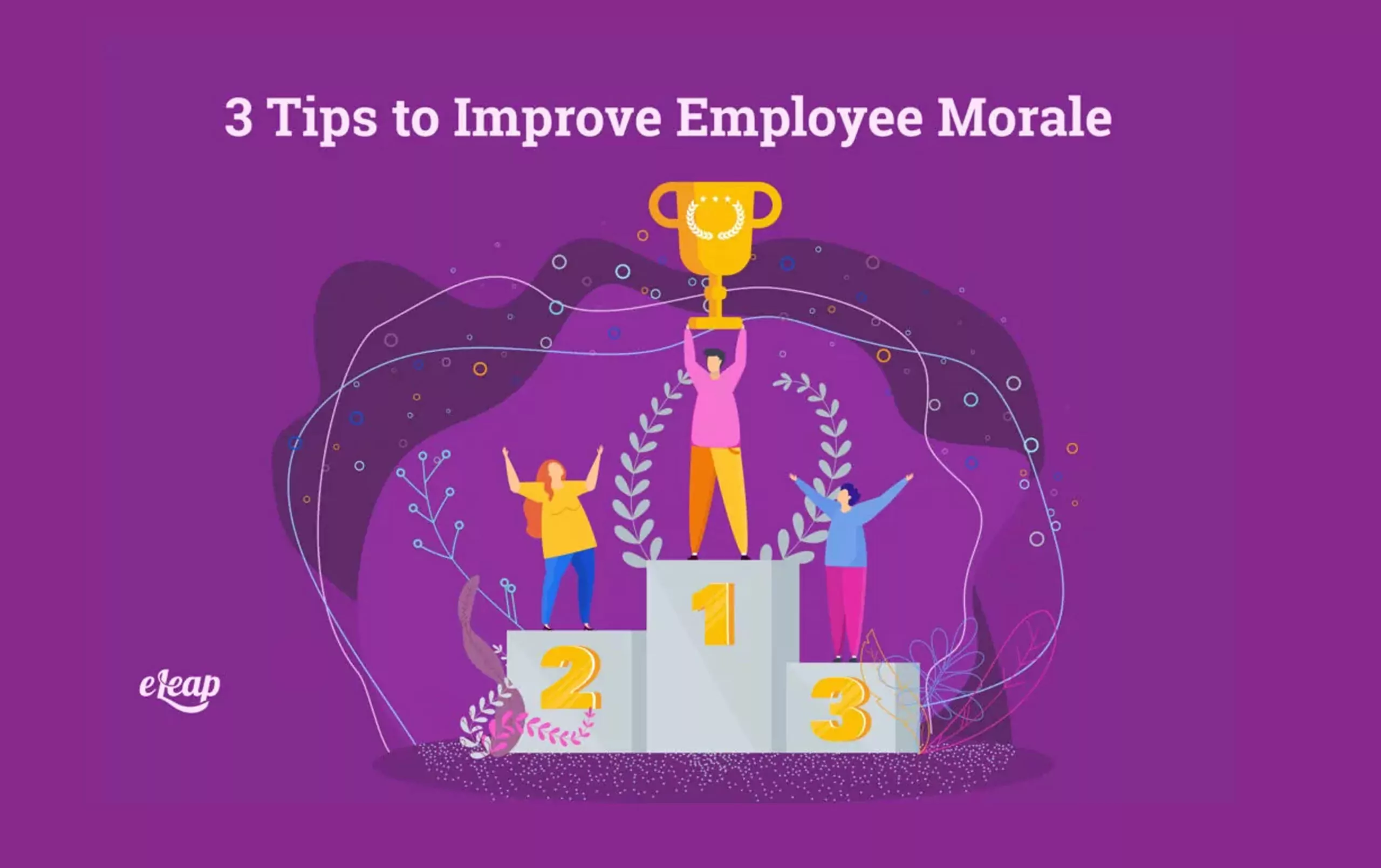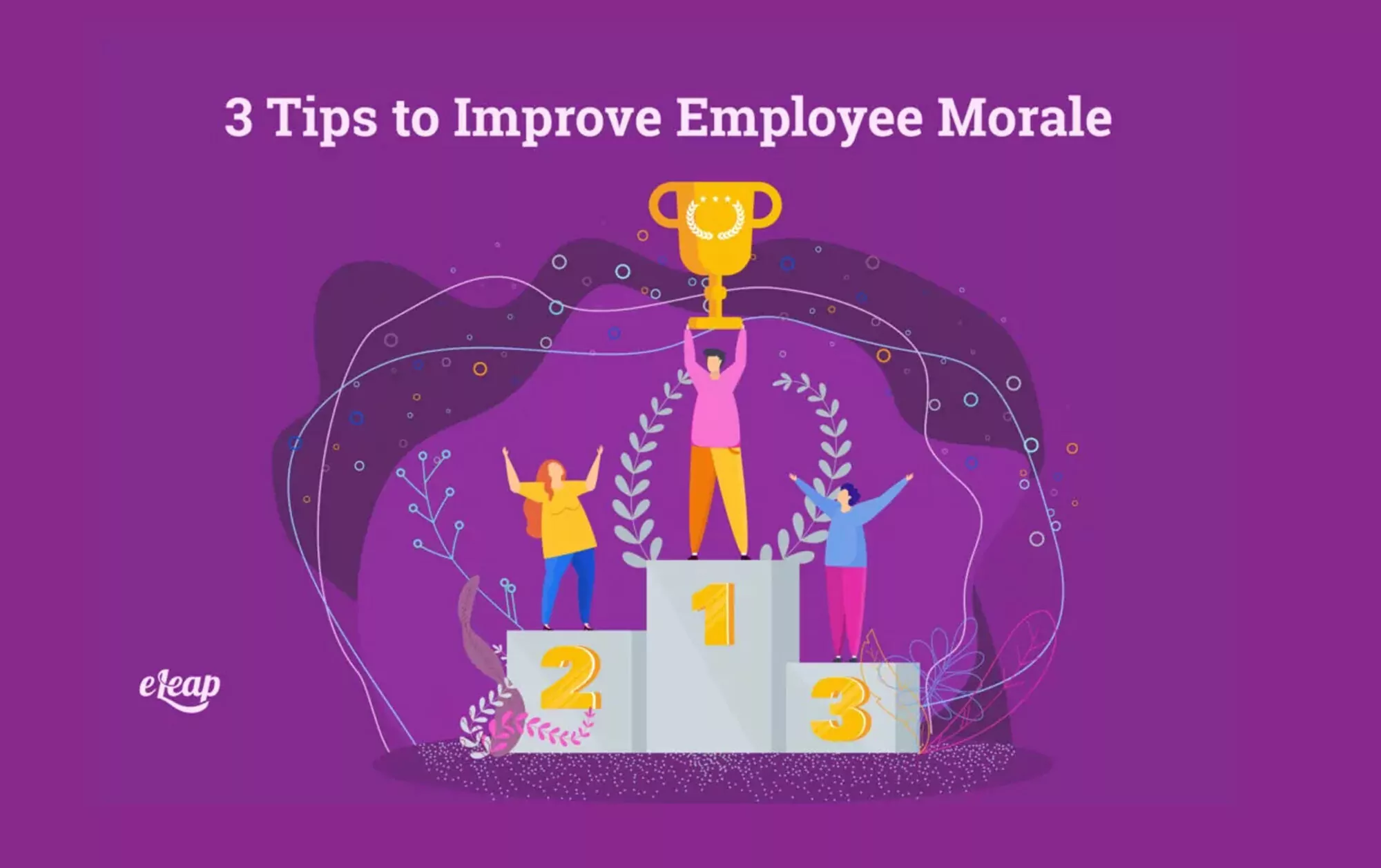3 Tips to Improve Employee Morale

There’s a lot of talk about employee engagement. Equally, we tend to focus on metrics like performance, or motivation, or productivity. However, managers often miss one of the most critical elements – morale.
Employee morale is that little something extra that gets employees to work on time and ready to take on the day. It’s a term used to describe a mental outlook in which a person is ready and willing to work, but it is also a crucial indicator of things like culture and engagement.

What Is Morale?
Morale can be difficult to define in concrete terms. Merriam-Webster defines it as “the mental and emotional condition (as of enthusiasm, confidence, or loyalty) of an individual or group concerning the function or tasks at hand” as well as “the level of individual psychological well-being based on such factors as a sense of purpose and confidence in the future”.
In laymen’s terms, morale is a kick in the pants. It’s the emotional undercurrent that pervades your team and buoys members throughout their tasks. You could say it is the inner confidence required to perform their required job duties.
Morale vs. Motivation
Morale and motivation are often confused because they are somewhat similar and somewhat related. However, they are not the same. Motivation is a measure of an employee’s willingness to work – they’re “ready and raring to go”. Morale, on the other hand, has more to do with loyalty and confidence, not just in themselves, but in their team, manager, and the organization as a whole.
Why Does Morale Matter?
You have many metrics to watch – engagement, performance, motivation, productivity, and profitability, for instance. Why add yet one more to the list? Actually, morale is a critical factor.
When morale is high, employees are more engaged and productive. When it is low, they begin to disengage, productivity drops, and profitability is affected. It’s one of the lynchpins on which everything else rides.
Also, morale affects the company’s ability to compete. When morale is high, organizations have a definite competitive edge. When it falters, that edge is blunted.
How to Improve Morale
Given the importance of employee morale, you must know how to kick it into high gear and then keep it there. The good news is that you are probably already familiar with most of these methods, as they’re part of a good manager’s toolkit and play a role throughout performance management.
Communication Is Key
Nothing saps morale like a lack of communication. When it’s limited, employees feel rudderless, disconnected, perhaps even unimportant. When you share announcements frequently, check-in with employees often, and loop people into conversations that might affect them in some way, morale rises. Your people become more engaged because they feel more intrinsic to the company.
It’s also important to simply check in on employees regularly (we recommend at least weekly) particularly during the ongoing remote work situation. Ask them how they’re doing and show genuine interest in the answer. Find out what challenges they’re facing and ask how you can help. Ask what tools they need to do their job, what they need or want to learn, and how they feel about their team as a whole.
Regular, ongoing communication is critical to morale. Without it, your efforts will fall flat.
Acknowledge Employees for What They Do
Nothing saps morale like feeling you’re a faceless worker drone or just another cog in the machine. People want to be recognized when they do well, and that recognition will not only spur the individual employee to greater heights of achievement, but it has a knock-on effect on other employees. They see the recognition you show and it improves their morale, encouraging them to perform better, too.
How do you recognize employees? It can be as simple as mentioning them in a group meeting. Something like, “I just want to take a second to recognize the great job that Kim did in closing that deal last week. Thanks, Kim!” might be more than enough. On the other hand, you can offer more tangible rewards if you want.
What should you recognize? Anything and everything. Celebrate new hires and career milestones. Highlight good performance and loyalty. Cheer on people who preserver through tough challenges. You get the idea. Recognize your team for what they do every day and morale will skyrocket.
Get Feedback from Employees
Want to really drive morale up? Start asking for feedback from employees. This shows employees that you are listening, but also that you value what they think and feel. Of course, that only works if you follow through and actually implement some of their feedback. Asking for feedback and then letting it go out the window will drive down morale.
What sort of feedback should you ask for? You can request almost any type necessary.
- Ask if they’re progressing in their careers as they want.
- Ask what they think about the team’s performance.
- Ask what they think about your own performance as a manager.
- Ask what tools they need to succeed, or what training is required to improve performance.
In addition to asking for feedback, make sure to provide your own to employees. This should be done regularly through check-ins and one-on-ones and not through annual performance reviews. Real-time course correction and timely information are vital to changing the performance paradigm and maintaining morale. Few things are more demoralizing than critical feedback delivered long after it was needed.
Kick Morale into High Gear
Low morale saps performance, destroys loyalty and increases employee turnover. Use the tips we’ve covered here to change the situation. When morale increases, you’ll find employees are much more deeply engaged, that performance increases dramatically, and that turnover and churn decrease (along with their associated financial and time costs).
Two elements are essential in this process – a modern approach to performance management, and a cloud-based learning management system. Combined, they provide the means to achieve meaningful change, drive engagement, and bolster morale, all while building stronger teams capable of doing great things.